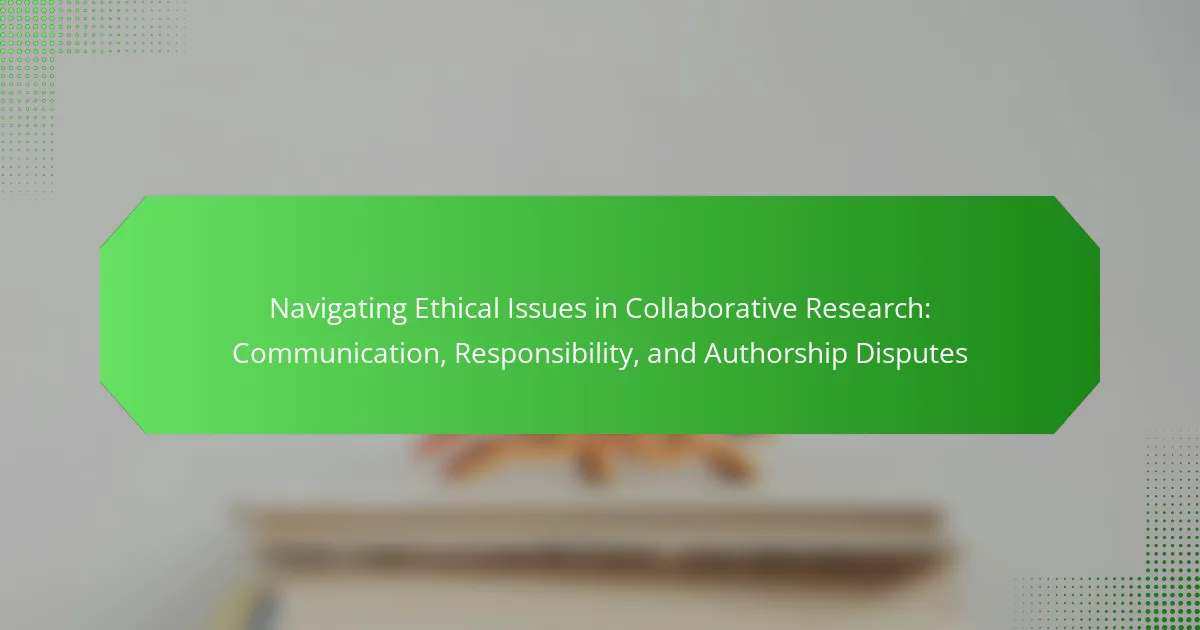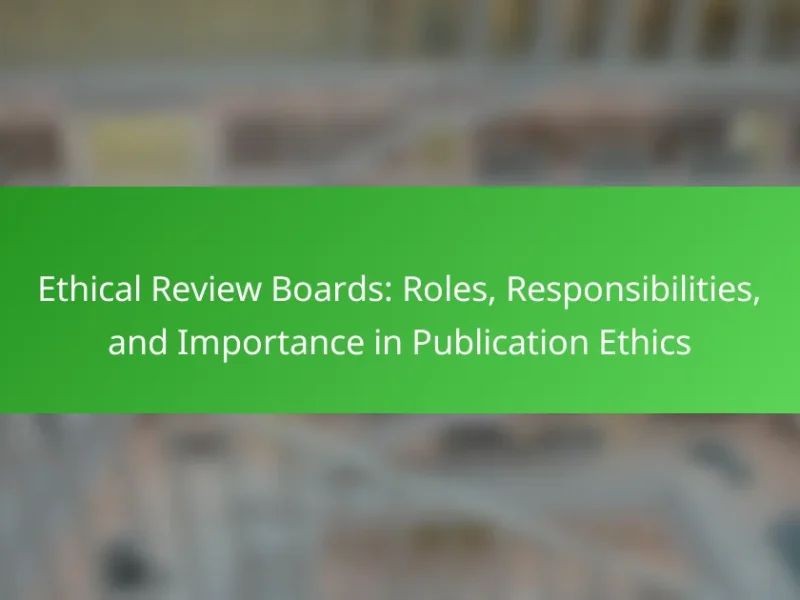Collaborative research involves multiple contributors working together, which can lead to ethical issues such as authorship disputes, data sharing concerns, and informed consent requirements. Authorship disputes can create conflicts over credit allocation, while data sharing must navigate privacy and intellectual property challenges. Ensuring informed consent is crucial for participant understanding and agreement. To address these ethical challenges, researchers should adhere to established guidelines, engage in ongoing ethics training, and foster clear communication within teams. Resources such as institutional review boards (IRBs) and ethics guidelines provide frameworks for maintaining integrity and trust in collaborative research efforts.

What are the key ethical issues in collaborative research?
Key ethical issues in collaborative research include authorship disputes, data sharing, and informed consent. Authorship disputes arise when contributors disagree on credit for work. This can lead to conflict and hinder future collaborations. Data sharing raises concerns about privacy and intellectual property. Researchers must balance transparency with protecting sensitive information. Informed consent involves ensuring participants understand the research and agree to their involvement. Ethical guidelines must be followed to maintain integrity and trust. These issues highlight the need for clear communication and established protocols among collaborators.
How do communication challenges impact collaborative research ethics?
Communication challenges can significantly undermine collaborative research ethics. Poor communication often leads to misunderstandings among team members. These misunderstandings can result in misattributed credit for contributions. They may also create conflicts regarding authorship and responsibilities. For instance, a study by Hara et al. (2003) indicates that unclear communication can lead to ethical dilemmas in joint publications. Furthermore, lack of transparency in discussions can foster distrust among collaborators. This distrust may cause individuals to withhold information or resources, compromising the integrity of the research. Therefore, effective communication is essential to uphold ethical standards in collaborative research.
What are common communication barriers in research teams?
Common communication barriers in research teams include language differences, cultural misunderstandings, and varying levels of expertise. Language differences can lead to misinterpretations of information. Cultural misunderstandings may affect team dynamics and collaboration. Varying levels of expertise can create gaps in understanding and hinder effective communication. Additionally, lack of clarity in roles can result in confusion and miscommunication. Time zone differences can also complicate communication in geographically dispersed teams. These barriers can reduce collaboration efficiency and impact research outcomes.
How can effective communication mitigate ethical dilemmas?
Effective communication can mitigate ethical dilemmas by fostering transparency and understanding among collaborators. Clear dialogue allows team members to express concerns and viewpoints openly. This exchange reduces misunderstandings that could lead to ethical conflicts. Regular discussions can clarify roles and responsibilities, ensuring everyone is on the same page. Research shows that teams with strong communication practices are more likely to navigate ethical challenges effectively. A study by Hinds and Bailey (2003) found that effective communication enhances trust and collaboration, which are essential in ethical decision-making. By prioritizing communication, teams can address potential ethical issues proactively.
What responsibilities do researchers have in collaborative settings?
Researchers in collaborative settings have the responsibility to ensure transparency and communication among all team members. They must share data and findings openly to facilitate collective understanding. Researchers should also acknowledge the contributions of all collaborators appropriately. This includes giving credit in publications and presentations. Additionally, they must adhere to ethical guidelines and standards relevant to their field. This ensures the integrity of the research process. Researchers are responsible for managing conflicts that may arise within the team. They should promote a collaborative environment that encourages diverse perspectives. These responsibilities are essential for maintaining trust and fostering successful collaborations.
What ethical responsibilities should researchers prioritize?
Researchers should prioritize transparency in their methodologies and findings. This includes sharing data and results openly with the academic community. Honesty is crucial in reporting results, even if they contradict initial hypotheses. Researchers must also ensure informed consent from participants involved in studies. This protects participants’ rights and autonomy. Additionally, researchers should prioritize integrity by avoiding plagiarism and properly attributing the work of others. Ethical review boards often oversee these responsibilities, ensuring compliance with established ethical standards. Following these principles fosters trust and credibility in research.
How do responsibilities differ among research collaborators?
Responsibilities among research collaborators differ based on their roles and expertise. Principal investigators typically lead the project and manage funding. Co-investigators contribute significantly to the research design and implementation. Research assistants often handle data collection and analysis under supervision. Each collaborator’s responsibilities are defined by their specific skills and the agreements made at the project’s outset. Clear communication of these roles is essential to avoid misunderstandings. Research ethics guidelines emphasize the importance of defining responsibilities to ensure accountability. This structured approach helps maintain integrity and transparency throughout the research process.
What are the common authorship disputes in collaborative research?
Common authorship disputes in collaborative research include disagreements over authorship order, contribution recognition, and eligibility criteria. Disputes often arise when contributors feel their input is undervalued. For instance, some researchers may believe their intellectual contributions warrant first authorship. Others may argue that substantial data collection qualifies them for authorship. Additionally, misunderstandings about the criteria for authorship can lead to conflict. The International Committee of Medical Journal Editors outlines specific criteria that must be met for authorship. Failure to adhere to these guidelines can result in disputes. A study by Haeussler and Wood (2016) found that 30% of researchers reported experiencing authorship disputes.
What criteria determine authorship in research publications?
Authorship in research publications is determined by specific criteria. These criteria typically include significant contributions to the conception, design, execution, or interpretation of the research. Authors must also be involved in drafting or critically revising the manuscript for important intellectual content. Additionally, they should approve the final version of the manuscript before submission.
The International Committee of Medical Journal Editors (ICMJE) outlines these criteria clearly. According to ICMJE, authorship requires accountability for all aspects of the work. This ensures that any questions regarding the accuracy or integrity can be addressed by the authors. Furthermore, authorship should reflect genuine involvement in the research process, not merely honorary or administrative roles.
How can authorship disputes be resolved amicably?
Authorship disputes can be resolved amicably through open communication and negotiation. Engaging in direct discussions allows all parties to express their perspectives. Establishing clear authorship criteria at the project’s outset helps prevent disputes. Documentation of contributions throughout the research process serves as a reference point. Mediation by a neutral third party can facilitate resolution if disagreements persist. Many institutions have guidelines that outline acceptable practices for authorship disputes. Following these guidelines can promote fairness and transparency. Research shows that collaborative environments foster better communication and understanding, reducing conflicts.

How can researchers navigate ethical challenges effectively?
Researchers can navigate ethical challenges effectively by adhering to established ethical guidelines and fostering open communication. They should familiarize themselves with institutional review board (IRB) requirements and ethical standards relevant to their field. Ongoing training in research ethics can enhance awareness of potential dilemmas. Establishing clear roles and responsibilities within collaborative teams mitigates misunderstandings. Regular discussions about ethical considerations promote transparency and accountability. Documenting decisions and processes provides a reference for ethical practices. Engaging with ethics committees or consultants can offer guidance on complex issues. Following these practices can help ensure that researchers maintain integrity and public trust in their work.
What strategies promote ethical communication among collaborators?
Establishing clear communication protocols promotes ethical communication among collaborators. These protocols define expectations and responsibilities. Regular check-ins ensure all collaborators remain aligned on project goals. Active listening fosters mutual respect and understanding. Providing constructive feedback encourages a positive dialogue. Transparency in decision-making builds trust among team members. Documenting discussions and agreements creates a reliable reference. These strategies collectively enhance ethical standards in collaborative environments.
How can regular meetings improve research ethics?
Regular meetings can enhance research ethics by fostering open communication among team members. This communication helps to clarify ethical standards and expectations. When researchers meet frequently, they can discuss ethical dilemmas as they arise. This proactive approach enables timely resolution of potential issues. Additionally, regular meetings promote accountability among team members. They encourage individuals to uphold ethical practices consistently. Research by Steneck (2006) emphasizes that communication is vital for maintaining ethical standards in research. Thus, regular meetings serve as a platform for reinforcing and discussing research ethics.
What role does transparency play in ethical collaboration?
Transparency is crucial in ethical collaboration as it fosters trust among participants. When collaborators openly share information, it reduces the likelihood of misunderstandings. Transparency also ensures accountability, as all parties are aware of each other’s contributions. This openness can lead to more effective communication, enhancing the overall collaboration process. Research shows that transparent practices improve the quality of outcomes in collaborative projects. For instance, a study by L. J. Smith in the Journal of Research Ethics highlights that transparency leads to higher satisfaction among team members. Thus, transparency plays a vital role in maintaining ethical standards in collaborative research.
What frameworks exist for managing research responsibilities?
Common frameworks for managing research responsibilities include the Responsible Conduct of Research (RCR) framework, the Collaborative Institutional Training Initiative (CITI) Program, and the National Institutes of Health (NIH) guidelines. The RCR framework emphasizes ethical principles in research, including integrity, accountability, and transparency. The CITI Program offers training modules that cover ethical issues in research, including authorship and collaboration. NIH guidelines provide a structured approach to research responsibilities, particularly in grant-funded projects. These frameworks ensure that researchers adhere to ethical standards and promote responsible research practices.
How can ethical guidelines be implemented in research projects?
Ethical guidelines can be implemented in research projects by establishing clear protocols and procedures. Researchers should first define ethical standards relevant to their field. They must also ensure informed consent from participants, outlining the purpose and risks involved. Regular training on ethical practices can enhance awareness among team members. Additionally, an independent review board should evaluate research proposals for ethical compliance. Transparency in reporting results fosters accountability and trust. Documenting all ethical considerations and decisions is crucial for future reference. Adhering to these practices helps mitigate ethical violations and promotes integrity in research.
What tools assist in tracking responsibilities and contributions?
Project management software assists in tracking responsibilities and contributions. Tools like Trello, Asana, and Monday.com allow teams to assign tasks and monitor progress. These platforms provide visibility into who is responsible for what. They also facilitate communication among team members. Version control systems like Git track contributions in coding projects. Tools such as Google Docs enable collaborative editing and track changes made by each contributor. These tools enhance accountability and transparency in collaborative research.
What best practices can prevent authorship disputes?
Clear authorship guidelines can prevent authorship disputes. Establish clear criteria for authorship early in the research process. Document contributions from each collaborator to ensure transparency. Communicate openly about roles and responsibilities throughout the project. Regularly review authorship agreements as the project evolves. Engage in discussions about authorship in team meetings to align expectations. Seek consensus on authorship order before publication submissions. Adhere to institutional and journal policies regarding authorship to maintain compliance.
How can clear agreements on authorship be established from the start?
Clear agreements on authorship can be established from the start by having open discussions among all collaborators. These discussions should outline each person’s contributions and expectations regarding authorship. A written agreement detailing the roles and responsibilities of each author should be created. This agreement should specify the order of authorship based on contributions. Regular check-ins can help ensure everyone remains aligned throughout the research process. Documenting decisions and changes related to authorship is essential for transparency. Research shows that clear communication reduces misunderstandings and disputes later on. Establishing these protocols early fosters a collaborative and respectful research environment.
What role do institutional policies play in authorship clarity?
Institutional policies play a critical role in authorship clarity by establishing clear guidelines for authorship criteria. These policies define who qualifies as an author based on contributions to the research. They help prevent disputes by outlining expectations for credit and responsibility. Clarity in authorship is essential for maintaining ethical standards in research. Institutions often include procedures for resolving authorship conflicts. Research shows that well-defined authorship policies reduce misunderstandings among collaborators. For instance, a study published in the Journal of Academic Ethics highlighted that institutions with clear authorship guidelines experienced fewer disputes. Thus, institutional policies are vital for fostering transparency and accountability in collaborative research.

What resources are available for addressing ethical issues in collaborative research?
Resources available for addressing ethical issues in collaborative research include institutional review boards (IRBs), ethics guidelines, and training programs. IRBs evaluate research proposals to ensure ethical standards. Ethics guidelines, such as those from the American Psychological Association, provide frameworks for ethical conduct. Training programs educate researchers on ethical issues and compliance. Organizations like the Office of Research Integrity offer resources and support. Additionally, academic journals often have specific ethical guidelines for publication. These resources collectively help researchers navigate ethical challenges effectively.
What organizations provide guidance on research ethics?
Organizations that provide guidance on research ethics include the American Psychological Association (APA) and the National Institutes of Health (NIH). The APA offers ethical guidelines for psychologists and researchers. The NIH provides resources and policies for ethical research practices in health-related studies. Other notable organizations are the World Health Organization (WHO) and the Office for Human Research Protections (OHRP). The WHO sets international ethical standards for health research. The OHRP oversees compliance with ethical regulations in the United States. These organizations play a crucial role in promoting ethical standards in research.
How can researchers access ethical training programs?
Researchers can access ethical training programs through university-affiliated resources, online platforms, and professional organizations. Many universities offer mandatory ethics training for research staff, often through their institutional review boards (IRBs). Online platforms such as Coursera and edX provide courses on research ethics accessible to anyone. Professional organizations in specific fields also offer tailored ethical training programs. These programs typically include modules on responsible conduct of research and compliance with ethical standards. Accessing these resources can enhance researchers’ understanding of ethical practices in their work.
What literature is essential for understanding collaborative research ethics?
Essential literature for understanding collaborative research ethics includes “The Ethics of Research with Human Subjects” by David B. Resnik. This book outlines foundational ethical principles in research collaboration. Another key text is “Research Ethics: A Philosophical Guide to the Responsible Conduct of Research” by Gary Comstock. It discusses ethical dilemmas in collaborative settings. Additionally, “Collaborative Research: A Guide for Researchers” by Barbara A. S. Hodge provides practical insights into ethical considerations. These works collectively emphasize the importance of transparency, consent, and accountability in collaborative research.
What practical tips can researchers apply to ensure ethical collaboration?
Researchers can ensure ethical collaboration by establishing clear communication from the outset. This includes discussing expectations, roles, and responsibilities among all team members. Regular meetings should be scheduled to address any concerns and maintain transparency.
Additionally, researchers should document all agreements and decisions made during the collaboration. This creates a record that can be referenced if disputes arise. It is also crucial to respect intellectual property rights and give proper credit to all contributors.
Researchers should engage in mutual respect and foster an inclusive environment. This encourages open dialogue and collaboration, which are essential for ethical practices. Finally, seeking guidance from institutional review boards can provide insights into ethical standards and compliance.
How can researchers foster a culture of openness and respect?
Researchers can foster a culture of openness and respect by encouraging transparent communication. This involves sharing research goals, methodologies, and findings openly among team members. Regular meetings can facilitate discussions and address concerns promptly. Researchers should also practice active listening to understand diverse perspectives. Establishing clear guidelines for collaboration promotes mutual respect. Training on ethical standards and diversity helps build an inclusive environment. A study by the National Academy of Sciences emphasizes that such practices enhance team dynamics and research outcomes.
What steps should be taken if ethical issues arise during research?
If ethical issues arise during research, the first step is to report the concerns to the appropriate institutional review board (IRB) or ethics committee. This ensures that the issues are formally acknowledged and assessed. Next, researchers should document all relevant details regarding the ethical concerns. This documentation provides a clear record of the situation. Researchers must also engage in open communication with all team members involved. This promotes transparency and collective problem-solving. Consulting with legal or ethical advisors can provide additional guidance on navigating complex issues. Finally, researchers should review and adhere to established ethical guidelines and protocols to prevent future occurrences. These steps are essential for maintaining integrity and accountability in research practices.
The main entity of this article is collaborative research, focusing on the ethical issues that arise within this context. Key topics include authorship disputes, communication challenges, and the responsibilities of researchers in maintaining ethical standards. The article outlines how effective communication can mitigate ethical dilemmas, the importance of transparency, and the frameworks available for managing research responsibilities. Additionally, it addresses common barriers to communication and provides strategies for fostering ethical collaboration, ensuring that researchers can navigate ethical challenges effectively while promoting integrity in their work.


